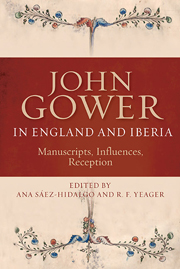Book contents
- Frontmatter
- Contents
- List of Illustrations
- Abbreviations
- Introduction
- I Manuscripts
- II Iberia
- 5 The English Literature of Nájera (1367) from Battlefield Dispatch to the Poets
- 6 At the Nájera Crossroads (1367): Anglo-Iberian Encounters in the Late Fourteenth Century
- 7 Spanish Literary Influence in England: John Gower and Pedro Alfonso
- 8 From Norwich to Lisbon: Factionalism, Personal Association, and Conveying the Confessio Amantis
- III The Classical Tradition
- IV Economy
- V Reception
- Notes on Contributors
- Bibliography
- Index
7 - Spanish Literary Influence in England: John Gower and Pedro Alfonso
from II - Iberia
Published online by Cambridge University Press: 05 August 2014
- Frontmatter
- Contents
- List of Illustrations
- Abbreviations
- Introduction
- I Manuscripts
- II Iberia
- 5 The English Literature of Nájera (1367) from Battlefield Dispatch to the Poets
- 6 At the Nájera Crossroads (1367): Anglo-Iberian Encounters in the Late Fourteenth Century
- 7 Spanish Literary Influence in England: John Gower and Pedro Alfonso
- 8 From Norwich to Lisbon: Factionalism, Personal Association, and Conveying the Confessio Amantis
- III The Classical Tradition
- IV Economy
- V Reception
- Notes on Contributors
- Bibliography
- Index
Summary
As Joseph Ramon Jones and John Esten Keller note in their introduction to their most accessible English version of Pedro Alfonso's The Scholar's Guide,
The Disciplina Clericalis has been called the first collection of oriental tales in a western tongue, in this case […] medieval Latin.
Though this assertion is not completely true, it can be said that Pedro Alfonso, in this little anthology of stories, was the first to give sudden vogue to age-old tales from the East and to make these quickly available in Latin, a language all western scholars could read.
That the Disciplina had wide and continuous readership on the Continent from its composition in the twelfth century throughout the subsequent Middle Ages and the Early Modern period is evident not only from the sheer number of extant manuscripts – Alfons Hilka and Werner Söderhjelm, editors of the definitive Latin edition, describe sixty-three manuscripts copied in Spain, Italy, France, Germany, the Low Countries, Austria, and England between 1200 and 1450, to which list John Tolan has added thirteen others unknown to them – but also from the significance to letters of those whose reliance on Pedro Alfonso's “little anthology of stories” can be shown to include (to quote Jones and Keller) “as pertinent examples, the Fabulae of Odo of Cheriton, Jacques de Vitry's Exempla, the Scala Coeli of Johannes Gobius and Archdeacon Clemente Sánchez de Vercial's Libro de los exenplos por a.b.c.”
- Type
- Chapter
- Information
- John Gower in England and IberiaManuscripts, Influences, Reception, pp. 119 - 130Publisher: Boydell & BrewerPrint publication year: 2014

